
Tyler’s District 2 is a sprawling area of west Tyler, reaching from North Glenwood Blvd. to south of Chandler Hwy. and includes a region between Hwy. 31 West and Hwy. 64 West. Derrith Bondurant, who calls herself a “communicator and connector,” is running against incumbent Broderick McGee. You can find McGee’s interview with The Tyler Loop here.
Bondurant grew up in Gulfport, Mississippi and graduated from the University of Southern Mississippi. Bondurant has served as Vice President of Institutional Advancement and Assistant Dean for Development School of Public Health at UT Health Northeast. She served as Alumni Director for UT Tyler and Development Officer for the College of Arts and Sciences, College of Business and Technology, Corporate and Foundation Relations. She also served as Executive Director for the East Texans Against Lawsuit Abuse, America’s Heartland Tourism Consortium and Opera East Texas. Additionally, she organized a local collaboration called Arts East Texas.
She has served on the Tyler Chamber Board of Directors, the Chamber Government Affairs committee, the Camp Fannin Association Board, and is an associate member of the Women’s Symphony League of Tyler. She also serves on the State Bar of Texas District 2 Grievance Committee, the Dean’s Advisory Council for the Texas A&M School of Public Health, UT Tyler Athletic External Advisory Council and the Smith County Republican Club and Smith County Republican Women. Most recently, Bondurant serves on the board of Tyler Innovation Pipeline.
The conversation has been edited for length and clarity.
Your campaign page quotes, “I’ve done my homework — there is so much unrealized potential here.” What and where is the unrealized potential of district 2?
When you look top to bottom [of district 2], it’s not just central west. At the top, we have streets that have no sidewalk. At the bottom, and the south side, we have beautiful, nice, very wealthy homes, I would say.
And then you have Fresh dropped in the middle of it. It’s the nicest grocery store on this end, but then you go up to our end of town where I live in the Cascades and you see this imbalance all the way up. There’s concern about extending the Old Jacksonville Highway to six lanes, the business interests on that side. It seems like in the south side we’re building up again, instead of the north side and building down.
Anybody that I’ve talked to has said, “Well, our district is diverse.” It’s not the same thing as having a lot of neglect and opportunities for growth. And that’s what I’m looking at. I’m looking forward to developing a development coalition that will help us move some of this west side influence to what has been happening on the other sides of town.
What is good for the west district is going to be good for Tyler because it’s our entry point of the most populated city next to us, Dallas. We have holes to fill in. And the largest land mass that’s undeveloped in Tyler is that 500-plus acres of land across from Earl Campbell Blvd. and next to Sam’s, that Provident Realty bought. We’ve got to put our full attention into that goldmine for developing and bringing all kinds of economic development clusters. And that will help our two out of three industrial districts we have on Earl Campbell, including Centene and Frenius.
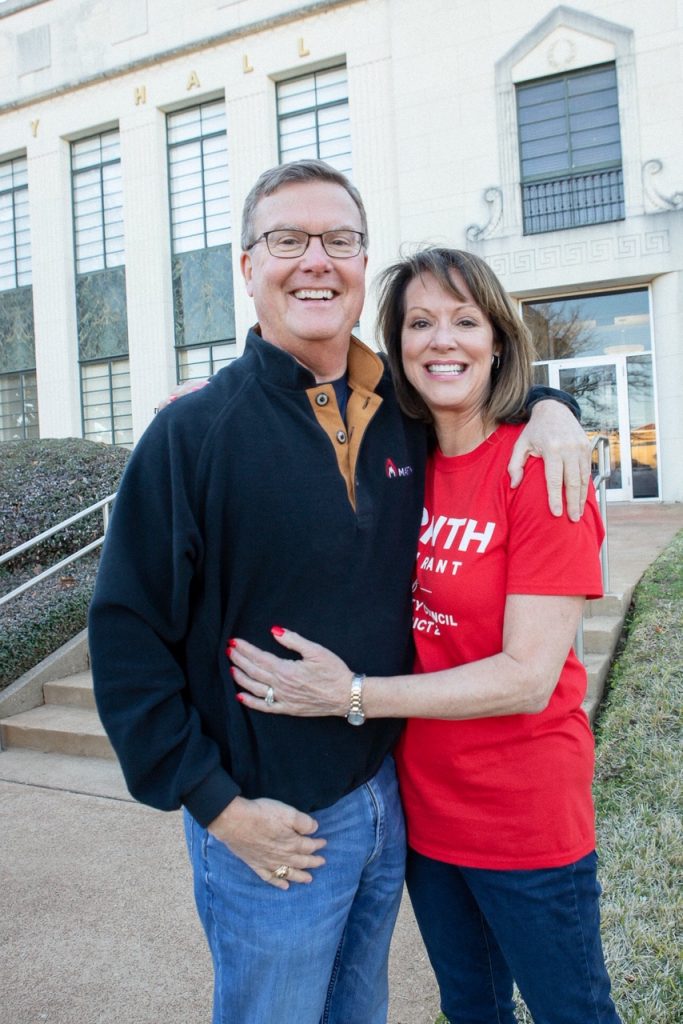
In that same quote about the unrealized potential, you mentioned “constructive conversations about innovation.” What are some of the ideas that are striking you as more innovative and interesting?
Oh, I think we’ve gone for a long time with our stellar reputation of being debt free as a city. I visited with the manager and I said, “How are we going to move forward without raising property rates, property tax rates, and how are we going to move forward by taking on no debt?“ And what I looked into, speaking with different developers around town and people that are leaders that I trust, they said, “There are all kinds of different advantages like a PID, right? A public investment district.” That really is interesting. I think it’s going to happen for that 500-plus acres with Provident.
It’s a way that the public investment, our tax rate is not raised, but you can use the average state rate and the difference between our rate and the state average rate of taxes — that in between amount can be used to be put in a fund. We’re in dire straits if people don’t want to raise taxes and we don’t want to go into indebtedness. We really need to look at exciting opportunities like that, of financing.
And also bringing some non-profits together that I think would help the disenfranchised, if you will. I don’t like that word as much. Maybe there’s lack, not in equity, but we have improvements to be made. And I think that we can do that in the areas of town by situating certain growth potential in areas that make us more valuable for a disadvantaged area. I’m for innovation all the ways we can look at it, but mainly it’s to an end. What are we really trying for, not just because it’s the thing to do in the world today, but how is it going to help Tyler?
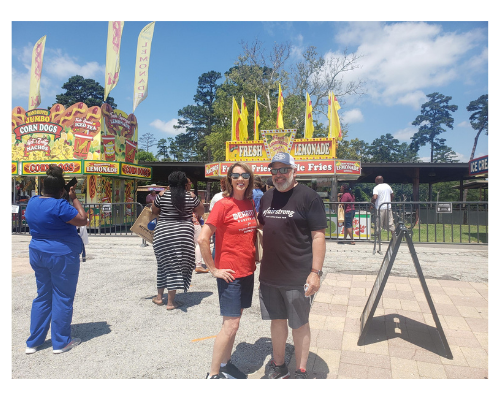
How is your campaign showing district 2 residents that you care?
Well, I have been meeting with so many different groups. Of course now I’ve made a lot more phone calls than I have been able to visit in person, but as I’m emerging and being able to talk more into small groups, I’m asking for their feedback.
So my campaign is not run on what I think my talents and gifts are, although I can enumerate what I think I can bring to the table. I want to also find out what people really think the needs are and they don’t have a forum to discuss them. So how I’m showing that I care is to, even in my neighborhood, I walk every day. I’m there, I’m present and people finally said, “You need to go do something greater than this. Find out why the trees are being cut or why there’s a storm cellar manhole not repaired or whatever.” I want to do something for the greater good.
And how I do that is I’m asking. I asked the people in my Sunday school, they know I’ve made my website available. I am answering questions and I’m finding out that by listening. People have not been asked what they think in my district at least in the last two years. I know I haven’t been, and I am immersed in everything going on in town. And we have not had a town hall meeting. I have not been asked to serve on a city board.
I don’t believe God put me here to sit and be able to retire at a young age and do nothing. So I’m going to do something, win or lose. I’m going to be a force to be reckoned with because I have so many needs that I’ve uncovered.
How has the pandemic shifted your concerns for the city as a prospective council member? And what would you say are the top concerns for district 2?
Well, people tell me the top concerns are lack of resources in the retail and the restaurants, basic needs. Everyone’s pretty happy with all the new schools. Even on our side of town is not too bad of a traffic flow in general. The consensus is that it’s traffic in general in all of Tyler, and of course I’d be voting on all of Tyler’s situations.
The pandemic has kept people relatively closed away from being able to communicate their feelings. We haven’t had any kind of outlet for that. And I regret that.
I do think you have a group of people in the uprisings that we’ve had — civil unrest — and that have gained strength from this, from being closed, from having to stay home and having time to talk to each other. I think that’s why great strides can be made right now with discrepancies or deficiencies that we have in communities because they’re staying at home, they’re looking around their neighborhoods.
I think that’s where I can offer the greatest help, is to be that communicator and to have more distinct avenues of communication. That’s what we don’t have. I don’t think women have it. I don’t think neighborhoods have it. I don’t think Hispanics have it. I don’t think that the Black community around the Butler College and Texas College area have it for students. I don’t think downtown has it.
From the 40,000 feet level, I am really concerned about the census. I am totally concerned about the voting and availability of that. I am very much concerned about the census and the voting and the budget. I mean, the census is eventually going to drive that budget for the next 10 years. Other than public safety, my number one concern is financial stability.
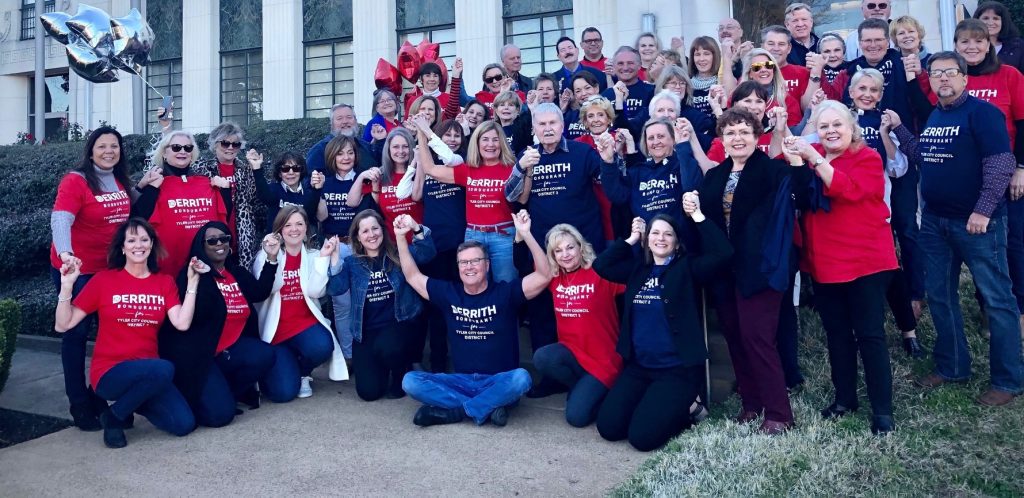
I saw your blog with the importance of being counted.What is at stake for district two in being counted?
Well, the biggest thing for district 2, as all of Tyler and East Texas, which is just a domino effect. I want to cry about it. I don’t know why I’m so emotionally involved in this census. I know it’s going to affect how we’re going to be able to deliver for the west side of town. If we don’t have the numbers in the Hispanic community and they’re not fearful of coming forward, if we’ve not provided avenues that are adequate for them to speak up and to deliver their thoughts and also their counts accurately, we’re not going to have the schools where they need them.
If we don’t have the exact counts for retailers to look at, we’re not gonna have a store there. The census is going to validate what our fears are and that people are not getting counted accurately. They’re not going to be able to vote accurately. We’re not going to be able to have a budget that’s accurate. And then the oil prices on top of that and a pandemic. It’s just the perfect storm for us to need to get out there and get counted. It means everything to the west side to have those numbers counted because they’re the most undercounted numbers right now that we have.
You served as assistant Dean for development in the school of public health at the now UT Health. How has that experience informed you to address the city’s public health needs, more than ever in light of COVID?
That was just amazing because the dialogues that I had with the dean and with all of the researchers. We are in the decade of public health. If we don’t start preventing things, which is to me the mantra of public health, we prevent people from catching diseases or prevent diabetes or unhealthy outcomes or even prevent drug trafficking and sex trafficking and the opioid crisis. We don’t prevent things, then we can forget down the line having enough resources to treat them. So that’s what I learned fully with public health. We have to fix problems on the front end so that healthcare can take care of them on the back end. We’ve got to have both. We have to identify public health as a force to be reckoned with and a force to help us.
And, you know, East Texas has the poorest health outcomes of all of the state. Working with the UT Health Center, we found out that’s why we were able to get a lot of legislative funding that other parts of the state didn’t get. The [Rio Grande] Valley had very bad health outcomes, very poor healthcare and education, even mental health issues. But we surpassed all of that as East Texas because we’re rural, because there’s obesity, because there’s smoking and mainly drugs, drugs, drugs, and that weighs us down a lot, but even suicide, the number one suicide rate.
It is going to be another innovative idea, this combination of resources of UT Health Center, UT Tyler and a medical school right in the middle, to bring that mission home. Oh my gosh, we have it all. Public health is going to be a case to be reckoned with. Everyone’s going to know how to spell it, everyone’s going to have a class on it in school and I hope we have everyone celebrating Public Health Awareness Month every year.
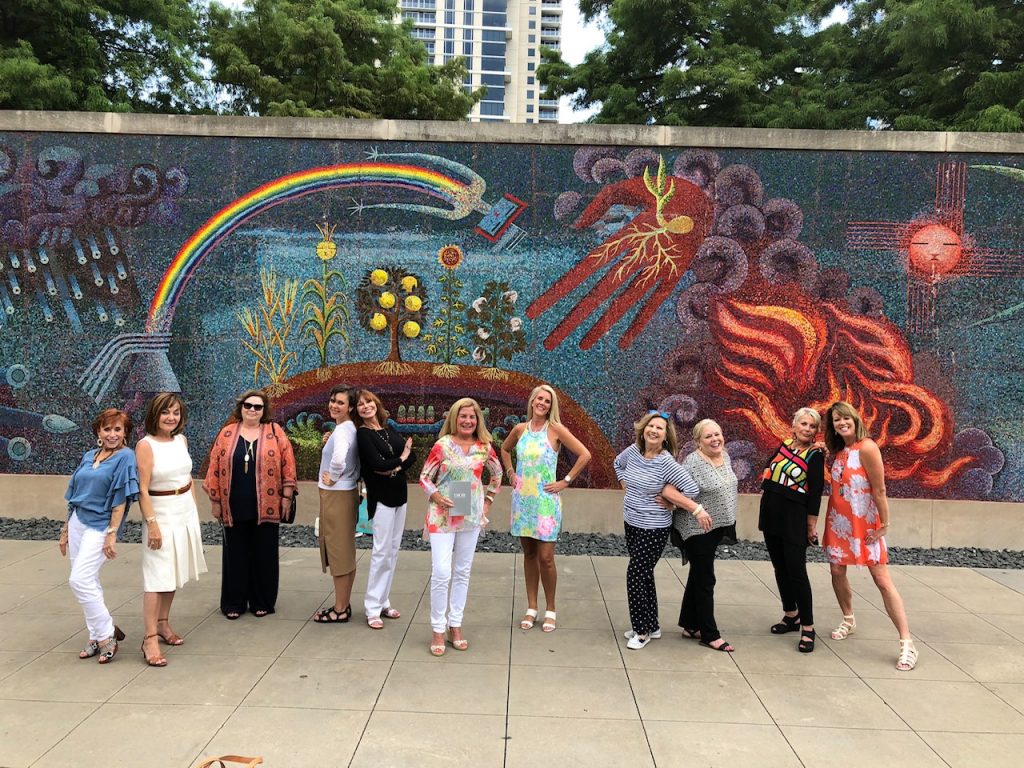
Will you tell me about organizing Arts East Texas? What was your vision and how has it come to fruition?
Well, that was started when I was directing Opera East Texas. I was always encroaching upon Tyler’s area of arts. We were crossing the Sabine to join hands and make arts prominent. We just decided it could be more than cowboys and country western and barbecue. The art was the icing on the proverbial cake that was established here.
We would meet monthly and talk in the Cowan Center lobby and share how we could work together, and we overlapped and integrated ourselves in so many different ways. It was phenomenally a big success.
I was thinking of the Tyler Museum. I don’t know if they would ever consider being East Texas Art Museum and expanding their reach, if they’re feeling isolated right now, and finding another space that’s not confining for them.
I like thinking out of the box and overreaching the historic norms that we have in place here. One of my initiatives is to have a nonprofit resource center if we could find a building to house it. Perhaps a YMCA building that has been vacant for a while. It could be a nonprofit resource center. It would be wonderful if we could all get together and plant a resource area. I think the model is Camp V and what they’re doing with veterans resources. We need to do that.
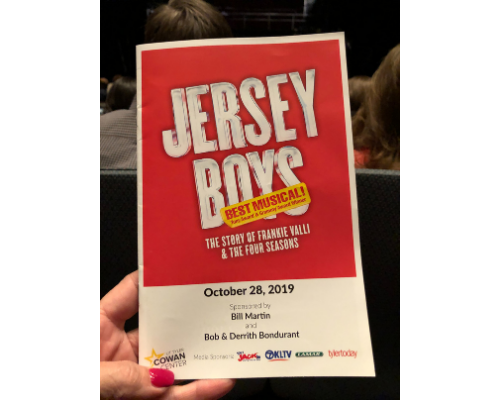
To add to that, how do you imagine the arts as an integral part of our city’s health?
You know, mental health is all about refreshing and renewing and feeling vital again, or finding a vitality that comes from within. It’s not anything that we can dress, or even put makeup on, if you will, with drugs or even therapy. Those are things that I think act in addition to what we can do in an environment that’s happy, that’s blissful. The very essence of walking down the street and seeing art on the wall, that has to help with mental health.
Towns flourish that are based on arts districts. It’s proven. I wish we had an arts district. We don’t. We’ve dubbed downtown. I’d like to see the plan. Not a big plan; I’d like to see the next step. We’ve got to have a rotation that actually plans how to showcase the musical and artistic talents.
We have to revitalize the Rose Festival. I want to revitalize the Rose Festival and the rose for everything that’s in this town. You have to start thinking of how we can bring this hierarchy of this wonderful “up here” that a lot of people don’t think they could even afford to go attend. And we have to bring it down into the people like the Yamboree and like the Tomato Festival. We have to bring in everybody that wants to participate. It needs to be the Rose Month of October, and it can be more than a rose queen. And when you do that, you can show the various cultural arts.

Tourism really expands when you have arts offerings in a city. It would take a coalition. I truly believe we could marshal a really good arts district and arts coalition here in town. We should pit ourselves against Austin and say, “How can we be better than Austin?” To me, they’re the epitome. We should pit ourselves against Austin and we’ve got Lindale breathing down our necks! They’re out there doing great things. Thank you, Miranda. And Neal McCoy in Longview. So we getter get with it.
Of the many organizations you’ve been involved with, which are you most proud of and which feel most helpful in preparing you as a prospective city council member?
Oh, wow. Just within the last couple of years, being involved with Hospice of East Texas has to be the most profoundly impactful on my life and also the most rewarding. I find it to be grounding for me. They say most people probably don’t want to work visiting the rooms. [I said,] “Oh, I do. I want to visit every person.” I want to hear what people say in their last breath. I want to hear how their lives were meaningful. I want to be there when people don’t have anyone around and never will. And they go on knowing that I’m the last person that patted them on the hand.
My husband started serving on the board and then I knew some of the people that worked there and I’m so glad. It’s just reeled me in. I take measurement of my life every time I go there. It came at the perfect time of my life, to round out my life, to know what’s important.
I think that’s the other part of hospice that helps me, is because I’m a talker, I’m a communicator. In hospice you have to listen. I think that’s a unique analogy to City Council. I have promised that I’m going to listen [and it] is what I’ve been doing for the last six months or plus, is to ask everybody what they think, what their ideas are and promise them that it is not falling on deaf ears. So I think that’s how it translates.
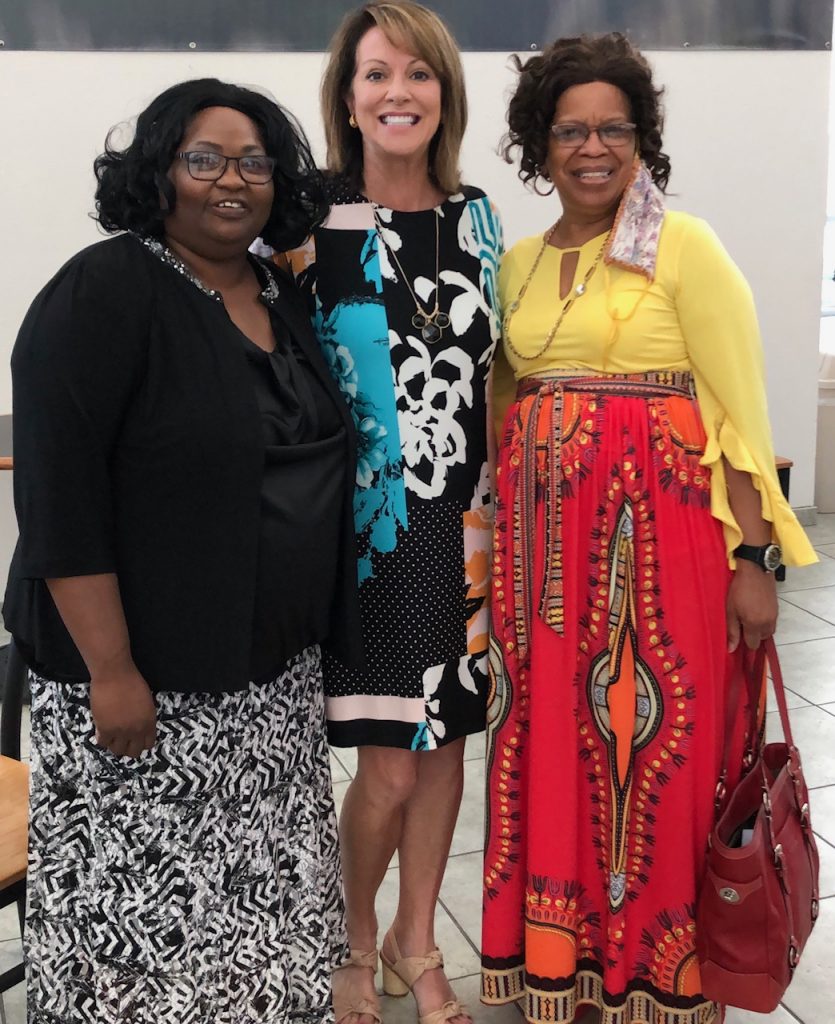
Bondurant visiting New Life Worship Center in Tyler with friends Philenia and Ella, September, 2020.
Your opponent, Broderick McGee, posted support of the Black Lives Matter movement on his social media. What is the movement’s relationship to your campaign and district?
I have been meeting with people of all different ages and all different races and my open ear and open door policy is that I’m trying to build coalitions in those areas that we need. I think that we really have a lot of issues out there with racial unity. And if you want to call it Black Lives Matter, I think all lives matter. I don’t like the term Black Lives Matter, but I have empathy for that. I’ve sat with people who’ve said, “Derrith, I just want you to say ‘Black lives matter,’ and I’ll say, “What Black lives are you talking about?” But I’m for all lives. And how that campaign or any others that are segregated campaigns and their influence on me, is that they are a force to be listened to.
We need to hear what their idea is no matter if it conflicts with my idea of, “Everything’s fine,” or “It’s not as bad as you think.” What they wanted was empathy from me. And I’ve have my crystal clear, great friends who have tried to influence and helped me understand it better. I’m gaining that understanding. They just want me to empathize.
I want people to understand that a lot of people in this group here in Tyler that want to be heard and that want Black lives to matter, they don’t want to defund the police. They’re not a citizenry that wants to take apart and deconstruct things. They want to be heard. They want to understand that we are encroaching on, maybe, their lives by not involving them enough in politics and political decisions. They’ve asked me to open doors for them and establish councils and coalitions so that we can bring Hispanic voices out and Black voices out and even Vietnamese voices out that we have an abundance of here.
So Black Lives Matter. I don’t like the term, I didn’t like the term. I probably never will like the term, because I don’t like segregating any one preference over another when it has to do with race or age or gender. I just want to hear people, though. We have to hear people. And I have promised them that I’ll make a difference in that area.
I don’t like the protests, the night after night of, meaningless to me, involvement in marching. What I want to do is I want someone to tell me that’s marching, “What can I do for you next step?” I want to know what’s the result of you marching that you would like to accomplish, and it can’t be what you’re protesting against. I want to know what you’re next for. And it’s not arresting a policeman and it’s not having a different trial. What’s the real essence of this? If it’s so that we have housing and sidewalks and safer schools or better public transportation — those are the things I want to know what you really mean. I want to drill down and tell me, “Stop doing all this walking and come sit at the table — and you have a table and I’ve prepared a table and the city should prepare a table to discuss — but do not remove the table. We haven’t even put a table down, so they can’t really remove it. But that’s what I say.

During his first term, your opponent has been involved with plans for the conference center and the Bellwood Lake development. What would you like to see happen regarding those projects?
Well, the involvement is, as a City Council, you’re involved in those plans that affect all of Tyler and you’re brought into them. The difference that I want to make in that regard is to be proactive. I am proactively meeting with civil engineers, with developers, with the economic development director. I have had all of these meetings saying, “What about that property?”
I’m proactively going out there, I’m not waiting for the issue to come be an element of discussion at the City Council meeting. I’m proactive, I’m not reactive. I promise that. And that’s my 100% availability. I think it’s going to take that — a full time job, to do it. I’ve heard the number one complaint is that we’re spending hundreds of thousands of dollars on consultants and we have not followed through with the plan. There’s been a hotel placement here, a hotel placement there for a convention. We’re not following through.
As a City Councilperson, I would go for my own focus groups around town and I would force a focus group on people, instead of waiting for them to read it in the paper or to read it online or to see it be tagged in a Facebook notice. I would go have my own outreach. I’m going to go around asking. “You’re not retired. You get your butt up and you’re going to serve on a committee. Which one do you want to be on these councils? You’re talented. You’re innovative, we need you.”
I’m living in the Cascades and Bellwood Lake, it’s just really where people put their boats in. And otherwise at night it’s just a racetrack and where people do wheelies and probably drugs or anything else. It’s lacking and we could have a boardwalk over there. It’s our park, for Pete’s sake. Either it’s our park and we clean it up and we make it nice, or we close it or we sell it or we develop it. So to me, options are there and pick one.
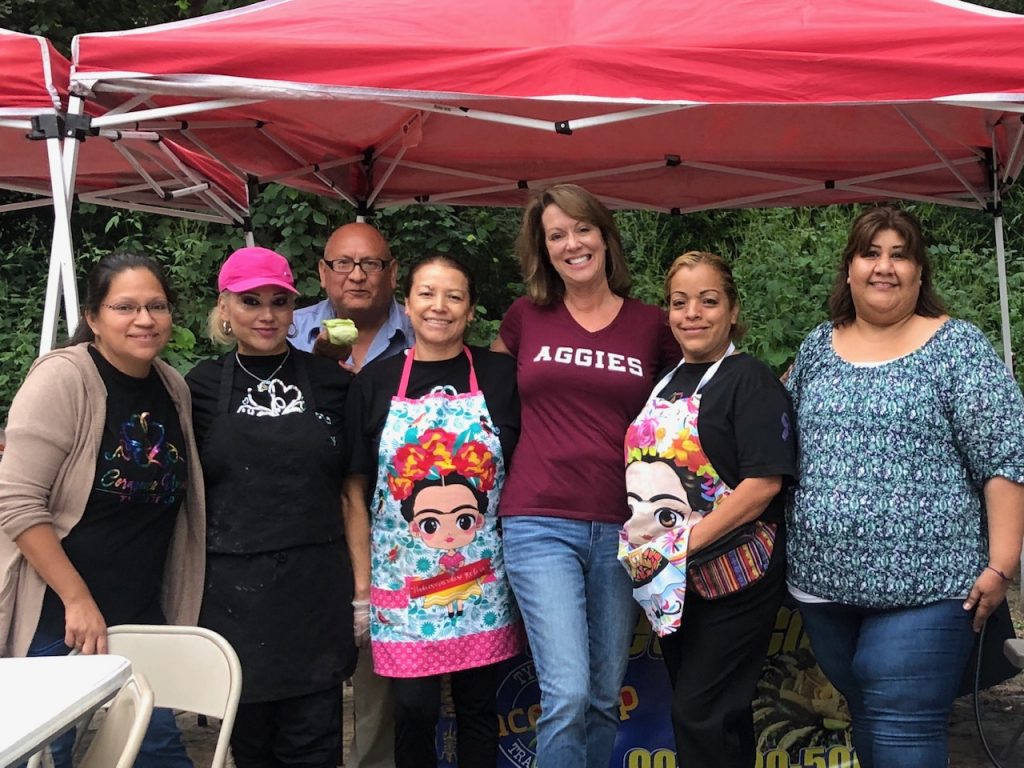
Peeking at your Facebook page, I saw this photograph of a field of rose bushes. It says, “Let’s find new ways of making Tyler famous without forgetting our heritage! What heritage and Tyler is important to you to not be forgotten?
Well, of course the rose. I want to make it a part of everything we’re doing. When I first went to the Rose Museum, I went through it a second time so I could see the videos again so I would not forget what they did to bring that Rose Festival. We could build on that because there is so much heritage that wasn’t just oil. We have that heritage of farming and all those residuals that came from the recognition that we’ve gotten from roses. Heck, we have a professional football player that’s put us on the map with Earl Campbell, being the Tyler Rose.
But I want to also add, I don’t want to forget the heritage of the people, the generations of the roots and the Roosths, the Genecovs and the Ritters and more. We had people that gave money and made the schools happen. UT Tyler was built on donated property and TJC. All of this heritage of philanthropy, and that’s my heart. I want to name streets. The roses can be a rallying point. That’s one layer of heritage I don’t want to forget. We know the Fair Foundation gave that property to build a parking garage, the only public one in downtown. Phenomenal. So let’s go back and piece our history and not forget. They’re the people we’re all standing on the shoulders of.
This question is also from Facebook in response to the TISD school board changing the high school names. I saw your posting asking for Tyler’s thoughts, and then you had no comment yourself. It literally says, “no comment.” Would you like to give a comment now?
I hated it when my high school consolidated crosstown rival high. We weren’t Vikings and they weren’t Commodores anymore. The new mascot was Admirals. My dad was my principal and known as “Victor the Viking.” He had no more high school and neither did I as an alumnus. We hated it. But change had to happen. I have the experience of that reluctance to change the name of anything that was so meaningful in my life and from my father’s legacy and all, I hate changing a name of a school.
But in fact, people were taking an issue here and it wasn’t going to be solved in any other way than us starting over. If there was not a way there was ever going to be solved, then what we do is to have to clear the table and start over. So I was for the discussion. I would’ve hated to be on that school board. But again, that’s why I want to be on the City Council is because I want to figure out the best way and make those tough decisions.
People had reasons, like it or not. It was the only way to move forward positively, was to wipe the slate and start over. So I truly believe what’s in a name when it means otherwise bringing people together.
That’s not a hard decision. We all lose something. We all gained something and hopefully it was a starting over point. And I think it was very instrumental for Tyler to be able to do that. Now we have to forget about that and we have to move forward. That’s a lot more than no comment. That’s where I truly feel in my heart.
If you had to pick one thing for people to know about you, what would it be?
I say what I mean, I mean, what I say. I’m authentic to the core, I’m pretty transparent. And I want people to know that for this job, I’m 100% committed, 100% available. It’s a calling. I’m not going to be representing one group. I’m a communicator, I’m a connector. And I have the network and vision of people and resources to make things happen.
I’ve had an abundance of life experiences from all over the board, arts to health to education. I’ve worked in the two of the largest employers with UT Health that are merging right now. That’s what I bring to the table more than my opponent.
Is there anything important to address that hasn’t come up; anything you really want people to know or understand?
I want people to be taught more about city government and how it works. I feel a real burden that not many know their City Council representatives, that no one knows important numbers, one directory in one place. It’s not easy to apply for a board or commission because you don’t even know those are available or how they work. So in essence, I wish that there could be a more strategic plan to impart the city government function to our districts.
That’s what I think the solution is, not protesting against something. “I’m for this.” That’s how we can move forward.
Love what you're seeing in our posts? Help power our local, nonprofit journalism platform — from in-depth reads, to freelance training, to COVID Stories videos, to intimate portraits of East Texans through storytelling.
Our readers have told us they want to better understand this place we all call home, from Tyler's north-south divide to our city's changing demographics. What systemic issues need attention? What are are greatest concerns and hopes? What matters most to Tylerites and East Texans?
Help us create more informed, more connected, more engaged Tyler. Help us continue providing no paywall, free access posts. Become a member today. Your $15/month contribution drives our work.







